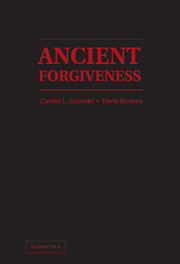Book contents
- Frontmatter
- Contents
- Contributors
- Preface
- Part I The Territory Philosophically Considered
- II Forgiveness Among The Greeks
- Part III Forgiveness Among The Romans
- 5 The Anger of Tyrants and the Forgiveness of Kings
- 6 Gender and Forgiveness in the Early Roman Empire
- 7 “To Forgive Is Divine”
- Part IV Judaic And Christian Forgiveness
- Bibliography of Works Cited
- Index
- References
5 - The Anger of Tyrants and the Forgiveness of Kings
from Part III - Forgiveness Among The Romans
Published online by Cambridge University Press: 05 January 2012
- Frontmatter
- Contents
- Contributors
- Preface
- Part I The Territory Philosophically Considered
- II Forgiveness Among The Greeks
- Part III Forgiveness Among The Romans
- 5 The Anger of Tyrants and the Forgiveness of Kings
- 6 Gender and Forgiveness in the Early Roman Empire
- 7 “To Forgive Is Divine”
- Part IV Judaic And Christian Forgiveness
- Bibliography of Works Cited
- Index
- References
Summary
The purpose of this volume is to seek out and explore what Adam Morton calls “forgiveness territory.” It is not that difficult to demarcate the general landscape. For us, forgiveness is located in a cluster of concepts consisting of pardon, mercy, clemency, indulgence, pity, sympathy, humaneness, and doubtless others; these concepts are associated with apology, repentance, remorse, and atonement; they result in remission of punishment or reconciliation or reinstatement; and they occur in the context of the transgression of some kind of code, religious, legal, or moral. It is self-evident that the transgression that gives rise to the opportunity for forgiveness also provides the possibility of the opposite reaction – of resentment and anger and the desire to take revenge for the perceived offense. But did this general landscape exist in the Roman world?
My aim in this essay is to explore “forgiveness territory” in its Roman version, particularly as manifested in the writings of the Stoic philosopher and imperial tutor Seneca (c. 4 b.c.e.–65 c.e.). To discover what, if anything, “forgiveness” meant to Seneca it is crucial to understand as fully as possible the, philosophical, social, political, and literary contexts that shaped his ideas. It is not adequate to zoom in on a word such as ignoscere, that is often translated as “to forgive,” and expect to find easy answers. That much is demonstrated immediately by considering one of the earliest occurrences of this verb in Latin literature, in the play Mercator (The Merchant) by the comic dramatist Plautus, writing in the late third and early second century b.c.e. At line 320 a character says humanum amarest, humanum autem ignoscere est (to love is human, to forgive is human too). Taken out of context, this could sound like Christian doctrine avant la lettre. But when we realize that the speaker is an elderly man who has fallen madly in love with a teenage girl who has been purchased by his son for sex, and that the speaker is responding to withering criticism of his ridiculous behavior by another old man, and that in the genre of comedy falling in love is the exclusive prerogative of adolescents, while lecherous old men never ever succeed in their cunning plans to sleep with young women, the picture looks rather different. Now that we know the context, we will do better to translate the superannuated would-be lover’s specious pleading as “to fall in love is human [referring to his own behavior], to make allowances is human too [referring to how he wants his elderly friend to behave toward him, as if he were an adolescent whose behavior might be excused].” Clearly, context is everything.
- Type
- Chapter
- Information
- Ancient ForgivenessClassical, Judaic, and Christian, pp. 79 - 96Publisher: Cambridge University PressPrint publication year: 2011



